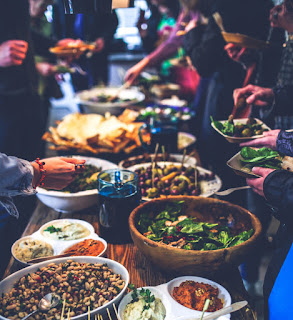Celebration, Eating Together, and Reconciling Romans 14:17
The word "celebrate" is used 4 times in the New Testament, in Luke 15, in the story of the two sons.
It is awesome to celebrate when the prodigal comes home, but is that the only time for celebration? Celebration is indeed bigger and more wide-spread in our lives than just when the prodigal comes home.
Celebration meals: eating is celebration in the Bible
What if God's design has always been for meals to be a celebration?
Giving thanks is a huge deal, when it comes to food, yet we often take it for granted. We have made meals into just consumption.
What if God's design has always been for food to be what binds us together, what we have in common and share together, in a joyful, thankful, and celebratory fashion?
Food has always been linked to community and celebration. In the Bible, there are feasts. In the Bible and in Jewish tradition, celebrations sometimes go on for a week. There is eating in the Bible, from cover to cover.
The first command in the Bible is "eat freely", and the last command is to "drink freely" (Gen. 2:16, Rev 22:17). Leonard Sweet has noted that it's been said that the OT could be summed up with:
- They tried to kill us.
- But we survived.
- Let's eat.
- I love you.
- Forgive me.
- Let's eat.
A Christians, we are always celebrating Jesus, and we especially do it or particularly do it, when we have joyful thanksgiving in meals together, with each other and with him with us.
This is eucharistia.
How do we reconcile or explain Romans 14:17?
Someone might object to the whole thesis of food being linked with celebration. They would quote for us, Paul's words in Romans 14:17, where Paul writes:
For the kingdom of God is not eating and drinking, but righteousness and peace and joy, in the Holy Spirit.How do we reconcile Paul's word here, with the fact that Jesus sat down and ate in his ministry, with people, so much so, that they called him a glutton, and a drunkard? Could it be that Paul is giving a word about legalism and not stumbling your brothers who are not able to live in the freedom to eat bacon and lobster?
Romans 14:17 is a word against both the 'ceremonialization' and 'libertine-ism' in regards to food and drink.
Jesus nor the kingdom does not give us a new ceremony to participate in. And kingdom values like righteous, peace, and joy; which are brought to bear in how we love others, inform or regulate all our behaviors, including how and what we eat.
Do this in remembrance of me.
And he took bread, gave thanks, broke it, gave it to them, and said, “This is my body, which is given for you. Do this in remembrance of me.”
-Luke 22:19
When he said, "Do this in remembrance of me", he was not instituting a ceremony. He was saying simply what he said. And what he said was that when you have meals together, remember me.
The "Do this", is to share meals, with each other and with him in our midst. We, the church, after Christ, institutionalized, ceremonialized, or sacramentalized things. How you 'do this' is fine, but to say that you are doing what Jesus commanded is where the problem lies.
The "Do this", was not an institutionalization of the way we take communion
What he did was not a ceremony, he did not have a special golden holder with juice thimbles nor a golden plate with matzah. Neither did he have them get into a line and take a sip and a nibble from the elements, wine and bread, from his hand.
What was the "this" that Jesus did do?
Jesus had a celebration meal with his friends and followers. He did a special toast, that was a prophetic, parabolic, and symbolic act; when he said, "This is my blood", and, "This is my body".
We take in his life to have life, and his life was sacrificed and raised from the dead for us.
This is what and who we are gathering around and celebrating. That's the "Do this".
In the Old Covenant, doing the ceremonies, which sometimes included food, and even laws regarding food, were extremely important and had to be followed, or else.
Paul's word in Romans 14:17, is to say that, "food is not the kingdom, nor does eating properly bring the kingdom; so stop imposing food rules on others who are free in Christ!"
The wider context of Romans chapters 12 through 14, is to be careful and sensitive around others who don't walk in the freedom that you have.
A contemporary example might be that we are free to drink alcohol, but many Christians choose a life of never touching alcohol. Paul is saying to folks who are free to and enjoy drinking, to be sensitive around those who do not feel that way, but still have Christ. That is the application or teaching of the wider context of Romans 12-14.
Paul is saying, in Romans 14:17, that the kingdom has come in a fuller manifestation, now in Christ, and it transcends the OT ideals expressed in Jewish life and tradition.
A legalistic mind today might see food as a necessary item like air, water, and sleep. And while agreeing that Christ transcends OT law and we should not obsess over food, ritualistically; we can then go overboard, and see the enjoyment of food and thankful celebration around food, as something that the pagans do, with worldly trapping to be avoided.

Comments
Post a Comment